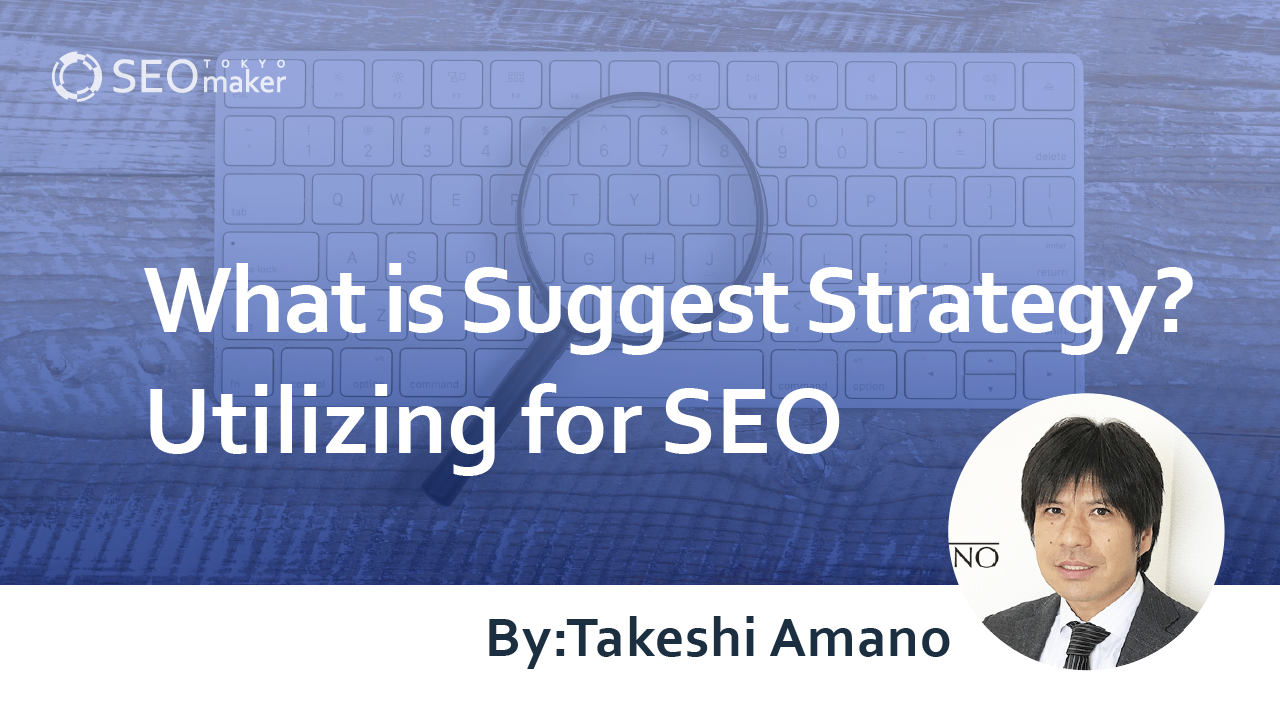What is Suggest Strategy? Utilizing for SEO
contents

In recent years, suggest strategy has gained attention as a cost-effective web traffic acquisition method.
I’ll explain that this strategy takes a completely different approach from the typical methods used in web acquisition, such as SEO tactics and listing advertisements.
What is the Suggest Feature?
What is the Suggest Feature?
In search engines, the suggest feature displays candidate related words as suggestions when a user types a keyword into the search box. This function is utilized by various search engines, including Google.
Suggest strategy refers to measures taken concerning the related words displayed by the suggest feature.
Specifically, it involves ensuring certain keywords appear or hiding keywords you do not want users to see.
As a measure to increase web traffic and as part of reputation management, many companies have adopted this strategy.
If executed well, it can guide users searching with keywords to your website.
Additionally, results can often be seen in a short period, and the cost of acquisition is remarkably low, making it a highly profitable strategy. Combining it with other SEO measures can further enhance its effectiveness.
What are Suggest Keywords?
Suggest keywords are the words suggested to users when they perform a search.
For each keyword, the system selects words based on past search data and user intent to meet user needs. With the increase of smartphone users, who find typing cumbersome, suggest keywords prove to be very useful.
Suggest keywords do not make the same suggestions to all users but tailor proposals more closely to each user. These suggestions vary based on the relevance to the user, the frequency of searches, and the location of the searches, and are not fixed proposals.
Suggest keywords are constantly updated to display tailored keywords by analyzing the search desires of each user, revealing the information users want to know.
How Suggest Keywords are Displayed
The mechanism for displaying suggest keywords can be based on “search needs” or “search history.”
In suggest based on search needs, if you enter a word in the search box like “fashion sh,” it will display high-demand search words starting with those characters, such as “fashion shoes.”
In suggest based on search history, it displays words related to the user’s past searches, showing keywords related to the user’s interests for more efficient typing.
In Google Suggest, the suggestions are made based on keywords that many people search for. Generally, the most frequently searched keywords are displayed, but the suggested keywords can vary by the search region.
In contrast, Yahoo! JAPAN shows compound keywords that are searched along with the entered keyword, and the same keywords are displayed regardless of where the search is performed in the country.
Additionally, when conducting searches on devices like smartphones or computers, using incognito mode, which does not save search history, ensures that your searches are not influenced by your personal search history, regardless of the search engine used.
Search Suggestions Vary by Location
With the widespread use of smartphones, searching has become more accessible anywhere, and the suggest keywords that appear can vary based on the location of the search.
A clear example is searching for “lunch,” where suggest keywords might show combinations with local area names near your current location.
The two images below show Google search results from different locations. They demonstrate how the same keyword can yield different suggest keywords.
Advantages of Suggest Strategy
- It can target a different segment of potential customers than other SEO measures or listing advertisements.
- It is easier to gather traffic from competitive big keywords.
- The effects can be seen relatively quickly (in some cases, as soon as a few days).
- There is less risk of penalties to the target site, offering peace of mind.
- It is compatible with searches from smartphones.
- There are no per-click fees, allowing for a low-budget approach.
Moreover, when a company’s name appears in suggests, it often gives users the impression that it is a well-known shop, service, or company.
Thus, it is ideal for branding, allowing you to achieve both increased traffic and branding effectiveness with a single strategy.
Related Search Keywords
Similar to suggest, there is a feature known as related search keywords.
In Google, these are displayed within the search results as “search keywords related to [your search term].”
In Yahoo!, related keywords are shown next to the magnifying glass icon, often referred to as “magnifying glass function,” “Yahoo! Magnifying Glass,” or “Yahoo! Magnifying Glass Keywords.”
The strategy for related search keywords, sometimes called “Magnifying Glass SEO,” also accommodates users who do not click on suggests, making it effective in conjunction with other measures to boost web traffic.
Especially in Yahoo!, where the magnifying glass display is positioned above listing advertisements, it offers a high PR effect.
What is Suggest Pollution?
Suggest pollution refers to the filling of suggest fields with words that carry a negative connotation. When negative words become candidates, users tend to perform searches that yield negatively charged results.
The presence of even one negative keyword can lead users to repeatedly perform negative searches.
The trouble with suggest pollution is that it can occur even if the suggestions are not based on facts. Malicious individuals can draw attention by posting on social media or forums, leading to suggest pollution.
However, suggests can be removed using the methods described below.
Be cautious with suggest keywords that appear with company names or business names. If negative information about a company is mistakenly conveyed through these suggests, it can damage the company’s image and significantly affect hiring.
-black
-worst
-power harassment
Beside the above, there are various other negative keywords. In today’s world, where internet searches are common, the spread of negative information can lead to the cancellation of transactions or a decrease in potential applicants, making any negative representation on the web disadvantageous for businesses.
It is crucial to address negative suggests as soon as they are identified.
How to Remove Negative Suggests Yourself
You can request the removal of negative suggests from search engines. For Google, this involves selecting the option to report inappropriate suggestions found at the bottom right of the suggest keywords, checking the problematic suggest, choosing why it is inappropriate, and submitting a removal request.
Yahoo! JAPAN also provides a contact form for the removal of suggest keywords.
Negative suggests often arise from websites or anonymous forums that contain negative information. When users see negative information and search for related keywords, the likelihood of these words appearing in suggests increases. An effective way to cut off the source of negative information is to directly request the website administrators to remove it.
Most sites have a contact form through which you can smoothly request deletions.
How to Seek Legal Assistance
If personal efforts are challenging, consulting a lawyer can be effective.
When consulting a lawyer, it is important to choose one knowledgeable about the internet. Not only should they be versed in internet-related laws, but they should also understand fundamental aspects like servers and domains.
Finding an internet-savvy lawyer can be done by searching online to check if they have relevant information, getting referrals from others with similar issues, or consulting local bar association legal advice centers.
Consultations with a bar association can be free or paid, depending on the bar association and the nature of the consultation. They also have systems to refer lawyers suited to your specific issue, which can save you the effort of searching for a lawyer from scratch.
With the widespread use of smartphones, the rapid spread of negative impacts has become a significant concern. Prompt action is needed to mitigate the adverse effects of suggest pollution.
How to Utilize Suggest Keywords for SEO
To master SEO, you need to address various factors. Efficient and strategic use of suggest keywords is crucial for effective SEO.
By using tools, you can obtain a large number of suggest keywords and check their search volumes. This allows you to create a list of potential keywords necessary for your content.
When optimizing for SEO, it is important that the content you create addresses the specific problems of the users. You need to understand the users’ intent behind their searches.
Using suggest keywords and tools effectively makes SEO easier, allowing you to use suggest keywords as a starting point to advance your SEO strategy.
Keyword Selection
One of the key internal factors for SEO optimization is keyword selection. It is an indispensable point for mastering SEO.
Keyword selection is an effective SEO measure that you can perform yourself and is also crucial as the foundation of your content.
Suggest keywords reflect users’ search intents, making it easier to structure content when selecting keywords. Creating content that solves user intent and selecting keywords using suggest keywords leads to successful internal SEO strategies.
Content Creation
When optimizing for SEO, it is important to create content that addresses users’ problems. You need to understand what issues users are searching for when they use search engines.
Suggest keywords often contain user needs, so by explaining them in your content, you can create content that meets those needs.
For example, when searching for “suggest keywords,” the following suggest keywords might appear
- Suggest keywords free
- How to check suggest keywords
- Bulk retrieval tool for suggest keywords
- Suggest keywords YouTube
- Related keywords for suggest keywords
- Suggest keywords Rakuten
- What is suggest?
- Suggest keywords Rakko
- Suggest keywords network
- Keyword planner
From these, you can understand that users have the following needs.
- Want to know how to get suggest keywords for free
- Want to understand the difference between suggest keywords and related keywords
- Want to know about suggests in Rakuten
- Want to visit the page for the bulk retrieval tool Rakko Keywords
Incorporating these elements into content themed around “suggest keywords” allows you to create user-focused content.
How to Research Suggest Keywords
When researching suggest keywords, in addition to typing into the search box, you can also use tools for your search.
Here are three tools to introduce.
- Rakko Keywords
- OMUSUBI
- Keyword Planner
It is important to use tools to select keywords or to know the keyword volume to obtain the information you need accurately.
Using tools can shorten research time and improve effectiveness. In today’s world, where information is constantly being updated, it is crucial to obtain accurate information.
Rakko Keywords
- Cost: Free to ¥9,900
- URL: https://related-keywords.com
Rakko Keywords is a well-known Japanese suggest search tool that displays keywords in alphabetical order and allows for bulk retrieval.
OMUSUBI
- Cost: Free
- URL: https://omusubisuggest.appspot.com
OMUSUBI is a tool commonly used for content creation and website production, focusing on keyword selection. It displays keywords on a map for analysis.
Keyword Planner
- Cost: Free
- URL: https://ads.google.com/intl/ja_jp/getstarted/
Keyword Planner is a tool provided by Google for advertisers. It can be used to research related words and, more importantly, to investigate monthly search volumes (search counts).
Q&A about Suggest Strategy
Q: Can suggest strategies be applied to all keywords?
A: Some keywords are restricted, but suggest strategies can generally be applied to other keywords. The time for keywords to appear varies, with some appearing quickly and others taking over a month.
Q: Are there any risks of penalties, such as the site being penalized?
A: Currently, there are no known cases where suggest strategies have led to penalties like lower SEO rankings.
Q: What is the click-through rate for the suggest display section?
A: It varies by keyword, but it is estimated to be about 8-15% on PCs and around 12% on smartphones. It also depends on the number of suggestions displayed and the number of characters shown.
Q: What are the differences between Yahoo! and Google in terms of suggest strategies?
A: Yahoo! generally displays the same content regardless of the device or search location, though there may be variations on some devices. Google’s display content varies by device and search location. Therefore, we conduct pre-search location planning for our strategies.
Summary
Suggest keywords offer a feature that proposes highly relevant keywords to users, based on hidden information about the search users. Understanding user information is crucial for mastering SEO. Suggest keywords are an effective means for keyword research, expressing user needs in text form, and grasping these needs is the key to SEO success. Using suggest keyword tools allows for quicker and more accurate gathering of user search intentions.
In addition to research, suggest keywords are effective for selecting keywords during content creation. It is important to understand suggest keywords and discern the accurate information users seek. For Google, long-term strategies often align the suggest content between PCs and smartphones, so if you prioritize smartphone display, focusing on Yahoo! might be more beneficial.










![What is a Description? Explaining the Meaning, Writing Style, and Changing Word Count – [2023 Edition]](https://www.switchitmaker2.com/en/wp-content/uploads/2024/09/what-is-description.webp)










